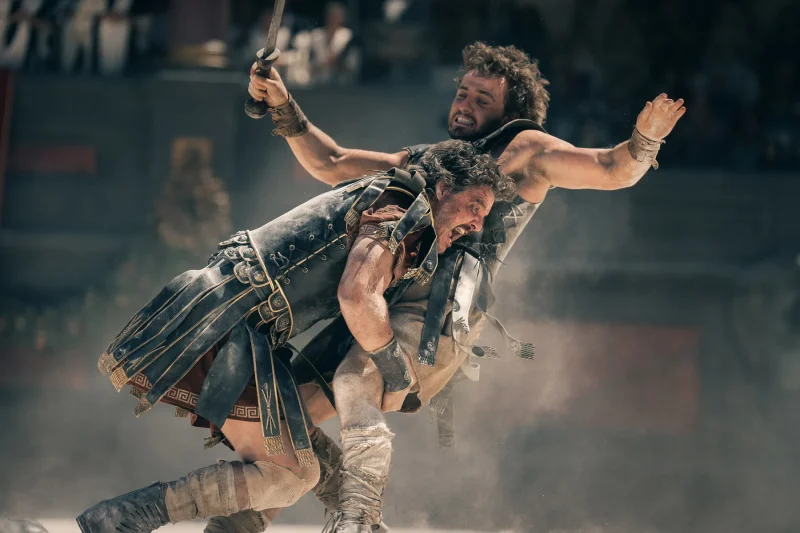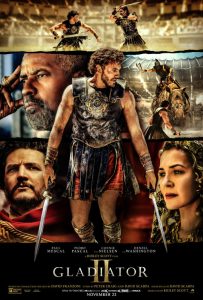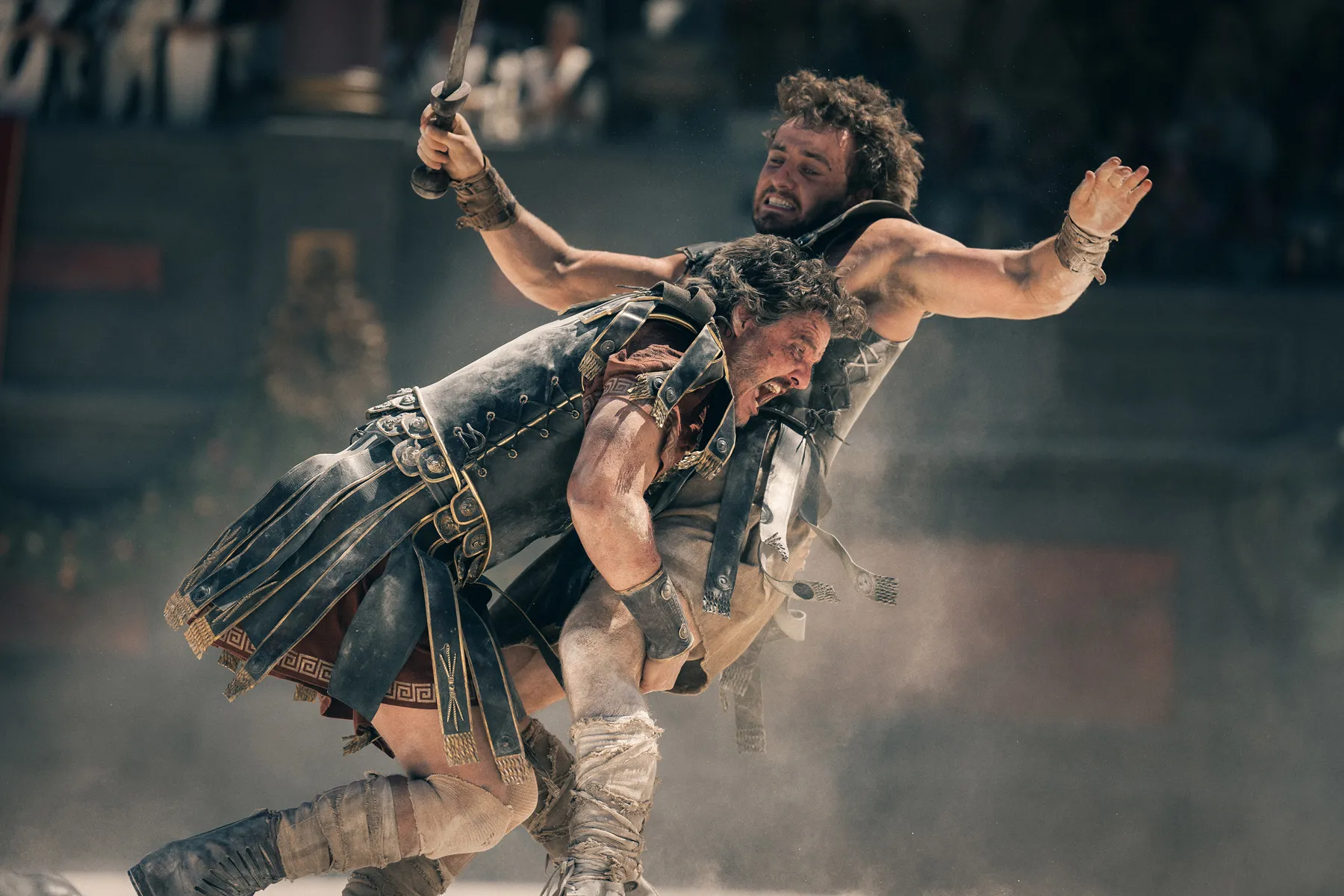
Most of us, on approaching our 88th year on this spinning orb, would expect to slow down some, learn to take the world and its many beautiful mysteries on their own merits, maybe explore a particular interest in, say, the sweep of a gust of wind over a field somewhere, or the brightness of a specific point of light in the sky.
As a filmmaker, octogenarian Sir Ridley Scott has opted to move in a different direction. The films of his later years tend toward the bombastic: spectacle-laced CGI effect showcases, attempting epic sweep with a fulcrum of bombardment. He particularly enjoys staging full-scale battles between huge armies, complete with explosions, hurtling bodies, and battle plains filled with burnt and desiccated corpses. At one time a brilliantly subtle and arresting visual composer, he’s now become a jarring sensationalist, cramming his frame with mayhem. He demands the audience’s attention not through nuanced, well-tended detail, but by bludgeoning them half to death in surrender.
The original Gladiator, from back in his more tempered years (2003), was far from Scott’s best work, even if it did finally win him a Best Picture Oscar. Heavy-handed and overstated as it was, it at least featured a fine pair of performances from leading man Russell Crowe (who won Best Actor), playing the estimable Maximus, and Joaquin Phoenix (nominated for Best Supporting Actor), playing twisty villain Commodus, with enough flair from its numerous arena scenes to keep it pulsating along.
Let’s not mince words here: This sequel, coming more than two decades after the original, is nothing more than schlocky pageant, and, despite the CGI-infested battle scenes with rabid monkeys, and sharks (!), and men being impaled by rhino horns, is as boorish and dull as anything Scott has ever made. It feels like a mail-in effort with a nearly unlimited budget, a toxic combination if ever there were one.
Part of the problem — besides an uninspiring, dreary script penned by David Scarpa (who also wrote Scott’s previous film, Napoleon, with similar results) — is the casting. In place of Crowe, the commanding ‘leader of men,’, at the height of his powers, this hero, the young, strapping Lucius, is played by Paul Mescal. As good as Mescal has been in other films (pointedly, he was the lead in one of my favorite films of the last decade, Aftersun), he is badly out of his element here.
Whatever you might think of Crowe, who has a history of incredible work alongside often dreadful movies, he does possess the necessary gravitas to play a Roman general who takes command of nearly every situation he’s put into. It’s the same quality that Peter Weir utilized so brilliantly in Master & Commander: The Far Side of the World, simply put, he is fully believable in the role, which takes pressure off the script to provide proof of his bona fides.
Mescal is a much more subtle and introspective sort of actor (hence his amazing work in Aftersun). Too often, as when Lucius is taken from being a POW in Numidia and sent, like Maximus, down into the dungeon of gladiators, we have to be told of his qualities rather than realize them for ourselves. Near the end, with virtually no scene work to support it, Lucius takes command of the rag-tag group of gladiators he’s come up with, who follow his every word to the letter, without ever having to earn their trust or present himself as a leader.
The aforementioned screenplay doesn’t do him, or many of the other actors, any favors. Save Denzel Washington, who seems to be having a marvelous time playing the devious Macrinus, the slave owner who initially buys the bedraggled Lucius, and offers him the opportunity to take his revenge against Marcus Acacious (Pedro Pascal), the Roman commander who lead the attack against Lucius’ coastal village, killing his warrior wife (Yuval Gonen) in the process, in return for following his orders.

Naturally, there is more intrigue afoot. Rome is being led by a pair of effete twins, Geta (Joseph Quinn) and Caracalla (Fred Hechinger), who love everything to excess, and use random cruelty as a means of avoiding boredom. It turns out Lucius’ enemy, Marcus, now married to Lucilla (Connie Nielson), the daughter of the emperor from the first film, is in fact planning an uprising against the current regime, a fact lost on Lucius until the two finally meet face-to-face. Naturally, Lucius himself might have a secret or two to his background that could be a factor in how things play out.
I’m not normally one to guess at plots, or twists, while watching a film. Not only am I not skilled at it, I actually prefer a film to work its magic on me, and surprise me at the end. I say this, because, about a third of the way through this laborious 148-minute opus, I wrote in my notes the major plot beats that were going to come, and hit at about a 90% success rate.
As for the filmmaking itself, Scott, who used to have such an eye for physical detail — think of the mesmerizing opening tracking shot in Alien, as the camera moves into the control room of the Nostromo; or the dilapidated, crammed-full apartment of J.F. Sebastian in Blade Runner — has given way to accomplishing much less with the intent of much more. The frame is filled with flaming catapult charges whizzing past, and bodies being torn to bits at every turn, but virtually none of the more subtle connective tissue between bouts of this extravaganza lend the film a true sense of weight. We don’t care about any of the characters, save, perhaps, Macrinus (Washington makes a full meal out of the table scraps the script gives him), and so, none of the arena scenes, even one improbably involving a pair of ships crammed into the Coliseum, now filled with 20-feet of salt water housing a fleet of great whites, give us a moment’s pause.
Instinctively, it’s not the kind of film you would want to set your hopes on anyway, but the shapelessness of it, and the shambling, poorly Xeroxed quality of the script, which tries in vain to assume some of the heft of the original, and bracingly fails at every turn, is both deadly dull and deeply depressing, just the same. Forget rousing, I would have settled for “dumbly entertaining,” and I’m sad to say the movie couldn’t even meet that flat threshold.


